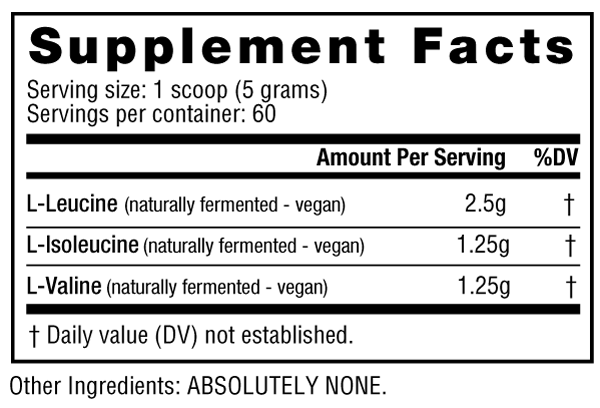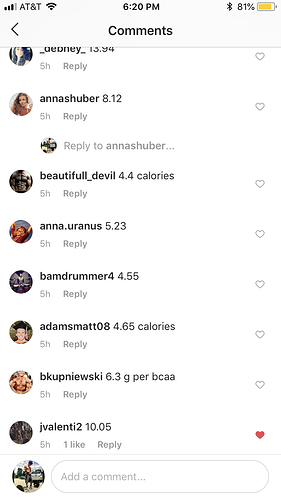Originally published at: How Many Calories are in BCAAs? The ISSN’s Dr. Doug Kalman Knows
The label says “zero calories” or doesn’t mention calories at all… so those BCAAs are calorie-free and guilt-free, right? WRONG. Yes, BCAAs Have Calories! But how many? Keep reading… Several studies have mathematically calculated the number of calories in the branched-chain amino acids, but nobody’s ever taken a tub of… …(Read more on the PricePlow Blog)
Brb kms ![]()
Good stuff man, this is actually beneficial for everyone
You’re absolutely right. Why is my Insta app not showing half of these???
Will hit up… that person. Might as well let the OG winner also win
Thanks Anthony! Contest maverick
Thanks. This is where I hope to take our YouTube more often. We have access to some really smart and well-connected people. It’s time to tap their minds!
Always working to double-check ![]()
Very interesting. I think it’s important to have this disclosed to consumers, but similar to how we treat our 5g of organic cane sugar in our natural pre/intra, I think it’s important to convey to customers what a significant amount of calories actually is.
Question, though: the body isn’t a bomb calorimeter… how are the BCAAs utilized by the body? Are they used as calories directly, or just as supplements to dietary protein, which would cause more protein to be broken down → gluconeogenesis → stored as fat? Definitely an interesting read, but more practical research needs to be done. As far as the FDA, they’ll never move quickly enough to make this change. But they only define protein as whole, intact chains of amino acids. And since BCAAs are not that, and therefore contain 0g of macros, 0 calories is an “accurate” callout.
Also, more than likely, the carbs and fats would be coming from lecithins, which are commonly used in BCAA blends.
Interesting, but I believe they used the unflavored BCAA 5000 from NutraBio. Here’s the label
Correction: Natural BCAA’s (fixed label)

In that case, the residuals may be coming from remnants of the fermentation process. Either way, like I said, the body isn’t a bomb calorimeter so I don’t think we should treat it as such
I tried asking this, and I think the answer is more complicated than anyone wants to deal with because calories are really “a human construct” of sorts, and are generally ‘close enough’ until you get insanely dialed in
I think that’s the problem. The research would be very impractical. There are probably so many variables that would affect how your body uses the energy from that blueberry. Man or woman? “Enhanced” or natty? In ketosis or not? Glycogen stores full or not? Food allergy? Amylase deficiency / forget to chew?
Etc etc etc… we have so many ‘modes’ of operation. With that said, I think calories are a “close enough” estimate for 98% of people. You get someone to be 100% consistent on MyFitnessPal with a food scale and they will see results, at least until they’re quite fit.
Perhaps free-form aminos need to be added to the list of accepted macros similarly to alcohol. Alcohol, I believe, is counted in total calories at 7/g.
I would like to question your interpretation of FDA CFR Title 21 101.36 b 2 i.
In your article you claim that this regulation states that free form amino acids have no calories. If you look at the actual wording, it says that free form amino acids cannot be declared as protein. That is different.
If you then look at CFR 21 101.9 c 1 i E, it clearly states that bomb calorimetry data is an acceptable way of determining calorie content.
Further, if you look at 21 CFR 101.36(b)(2)(i), it states that calories must be declared on a supplement facts panel if present in amounts greater than what could be declared as 0 in a food.
Thus, it is indeed compliant and I would say required to declare calorie content of BCAAs. Assuming the bomb calorimetry data is competent and scientifically sound, I would deem all the BCAA labels out there that dont list calories as being non-compliant.
What do you think?
Helluva first post
This was a very well put together first post! Welcome!
“Protein shall not be declared on labels of products that, other than ingredients added solely for technological reasons, contain only individual amino acids.”
BCAA supplements contain calories, but they’re not allowed to list them because in their individual form they don’t make up a complete protein.
https://www.accessdata.fda.gov/scripts/cdrh/cfdocs/cfcfr/CFRSearch.cfm?fr=101.36
@vaughntrue can chime in.
You are correct Doug. It’s a problem with the caloric labeling that should be addressed, but won’t.
Thats where I disagree. Where does it say that only calories from protein, carbs, and fat may be declared? The Atwaters factors are only one of numerous acceptable methods for determining calorie content.

